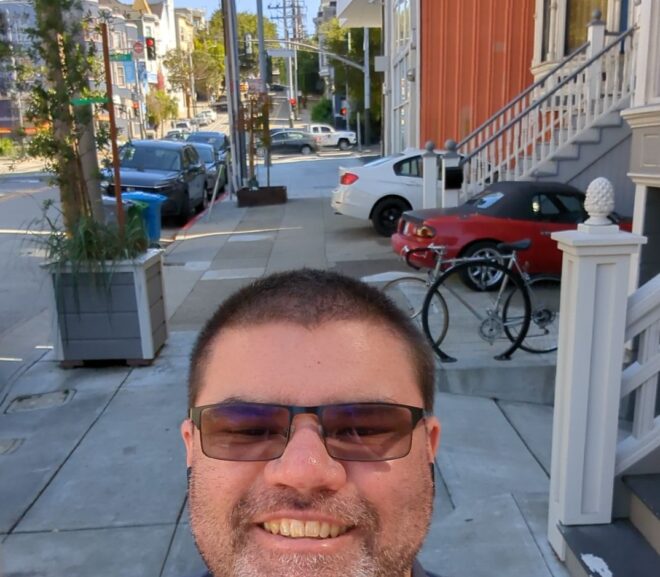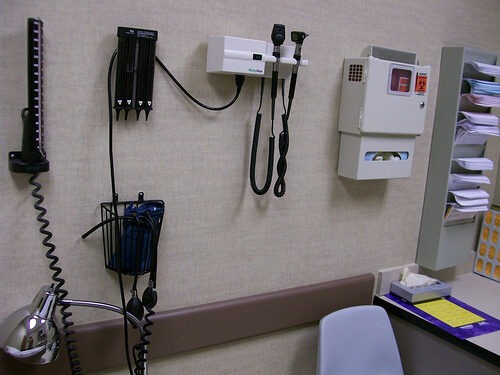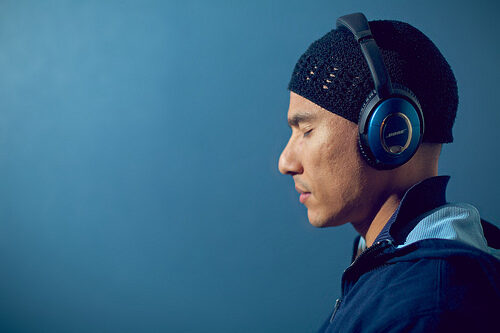Joseph Krauter is an autistic writer and tech worker who was diagnosed as an adult, while serving time at San Quentin Prison in California. We talked with Joseph about how his life could have been different with earlier diagnosis and supports, the difficulty of receiving an autism diagnosis while incarcerated, and how his life has changed since both his autism diagnosis and his re-integration into society.
Tag: accommodation
It’s important to avoid infantilising your teen or adult autistic offspring, meaning treating them as though they will always be a child—whether they’re five, fifteen or thirty-five.
There are good reasons why many autistic people avoid eye contact. And “when we look away, it doesn’t mean that we are not listening. We are not disrespecting you.”
The third row is one large panel. It is a close up of the eyes and nose of a white person with straight long purple hair and bangs, with eyes wide open. Black all-caps hand-lettered text on a white background at the top of the panel reads:
“If we try and make eye contact with people, it can totally distract us from what is being said because of how horrible it can feel and the effort involved.”
What happens to autistic people in prison? We spoke with Clare Hughes, the Criminal Justice Coordinator for the United Kingdom’s National Autistic Society, about the unique experiences of and considerations for incarcerated autistic people. Clare has been leading on the NAS’s work expanding its accreditation programme to police forces, prisons, and probation services. Note that while some discussed issues are UK-specific, many can be generalized. Photo © Dave Nakayama/Creative Commons license [image: Prison cell bars, with the background cell itself slightly out of focus.] Clare Hughes: We don’t know how many autistic people there are in prison in the UK: information about people diagnosed with autism isn’t collected routinely for the general population, let alone for prisoners, and many will be undiagnosed. HM Young Offender Institution (YOI) and Prison at Feltham diagnose young people in the prison, if they are there long enough. In February 2016, they identified that 4.5% of…
Since I didn’t know I was autistic, I just assumed there was something wrong with me and that I deserved what I got. I learned that intrinsically, I was less than a person, since I didn’t have a framework to tell me otherwise.
The specific learning needs of Autistic students are not always met in traditional special education, or even in specialized autism classes or schools. We talked with Susan Walton, founder of the new OASIS school near Santa Cruz, California, about ensuring her autistic son had access to an educational environment that not only helps him learn, but lets him thrive. TPGA: Tell us about OASIS. Who are your ideal students? [image: the OASIS school sign outside an exterior building door.] Susan Walton: OASIS, the Outdoor Autism and Special Issues School, is a new Non-Public School in Freedom, California, which is in Santa Cruz county. We’ve developed a program that we are excited to offer to new students. We serve seriously autistic students between Junior High and school completion. But more specifically, we cater to those autistic students who need a lot of activity. Our students crave movement and need variety. They…
TPGA is observing Autism Acceptance Month by featuring accounts from autistic people about the differences accommodations (or lack thereof) make in their lives. Today, Finn Gardiner talks about being the “truest, best self” he can be, tackling the “politics of shame head-on,” and recognizing “that I could live with my autistic, black, queer, trans self without guilt just for being alive.” Finn Gardiner [image: Selfie of a smiling black person with shaved hair & rectangular gold-rimmed glasses.] Finn Gardiner www.expectedly.org My path to autism acceptance and rejecting the politics of shame came along with my recognition of the other intersections I experience: recognising my gender identity, fighting internalised racism, and defining and following a path that was based on my own self-determined goals — rather than what parents, professionals, and other authority figures around me deemed appropriate. My childhood and adolescence were steeped in the politics of shame. Family members…
Photo © Subconsci Productions [image: Instruments on the wall of a doctor’s exam room.] TPGA is observing Autism Acceptance Month by featuring accounts from autistic people about the differences accommodations (or lack thereof) make in their lives. Today, Kate talks about her experience trying to participate in a TMS research study, how distressing the entire scenario was for her because of the way she was treated, and how autism researchers need to better understand and accommodate autistic people if they want more autistic participants in their studies. by Kate I have figured it out, and I kind of feel like a genius. I have figured it out, and it is this: Awareness is people talking to you. Acceptance is people respecting you. Awareness is that high-pitched, baby voice. Acceptance is speaking in a normal tone. Awareness is being invited to the table. Acceptance is making sure that you can reach…
TPGA is observing Autism Acceptance Month by featuring accounts from autistic people about the differences accommodations (or lack thereof) make in their lives. Today’s story is from Christine Langager, about being an autistic parent of an autistic child — and the frustration of often being excluded from autistic and autism-and-parenting communities when by definition one belongs to both. Christine Langager Photo © Christine Langager [image: Selfie of white woman with long braided light brown hair] As a child, I never fit in Always on the fringe, always looking in As an adult, it has always been more of the same Never fully clicking, but making my way I met the love of my life, and finally felt that I had a place to belong We started our family, and I looked forward to more ways to connect As our first son got older, his intensity was clear Play date invitations…
For someone like me—so sensitive to noise that I can actually perceive the bio-mechanical sounds of my own ears ringing aloud—my headphones are an incredible blessing.


![[[image description & transcription: A full-color hand-drawn comic strip. The first row contains two panels. The left hand panel has a green background. A blond white person on the left is talking and maintaining eye contact with the olive-skinned person with long dark hair on the right. Black all-caps hand-lettered text on a white background above their heads reads: “For allistic people (non-autistic) eye contact is a way of connecting with others in conversation.” The right hand panel has a blue background. On the left A black person with a natural hairstyle is looking down, with an uncomfortable expression on their face while on the right a white person with long straight hot pink hair and bangs has their eyes closed tightly. Black all-caps hand-lettered text on a white background above their heads reads: “For autistic people, it’s different. Eye contact is uncomfortable and invasive.” The second row is a black rectangle with white hand-lettered all-caps text reading: “When we look away, it doesn’t mean that we are not listening. We are not disrespecting you.” The third row is one large panel. It is a close up of the eyes and nose of a white person with straight long purple hair and bangs, with eyes wide open. Black all-caps hand-lettered text on a white background at the top of the panel reads: “If we try and make eye contact with people, it can totally distract us from what is being said because of how horrible it can feel and the effort involved.” Red-outlined word bubbles around the edge of the panel, in black all-caps hand-lettered text on a white background, read: “Keep looking” “Having I looked too much?” “This hurts” “Am I doing this right?” “I have no idea what they’re saying” “Can’t do this” and “I feel so vulnerable” All caps hand-lettered black text under the panel reads: “© Beth Wilson 2017”]](https://thinkingautismguide.com/wp-content/uploads/2018/01/Eye-Contact-12B252812529-8906717.jpg)






